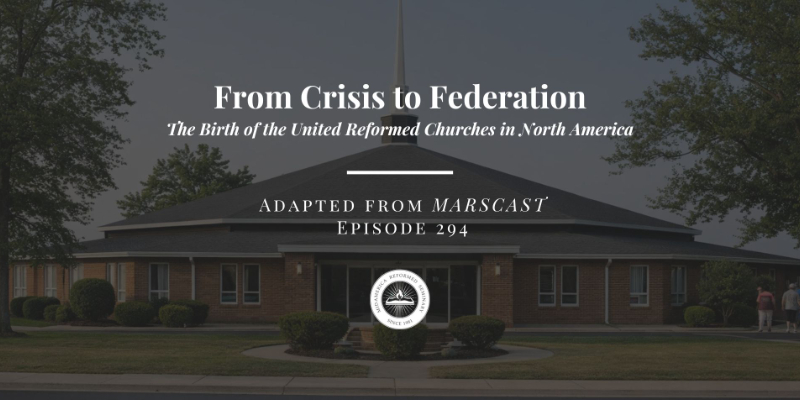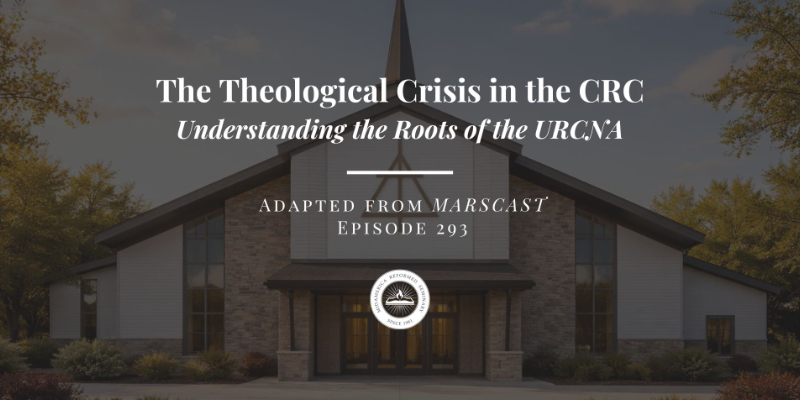
Mid-America Reformed Seminary: An Academy with a Purpose
The following is adapted from Dr. Cornelis Venema's MAJT article, "Mid-America Reformed Seminary: An Academy with a Vocational Aim."
When most people hear the word seminary, they instinctively picture a school where pastors-in-training learn theology, church history, and the biblical languages. That assumption is partly true—but only partly. In reality, the landscape of theological education today is far more fragmented.
Some seminaries function almost like academic think tanks. Their faculty publish prolifically, but their students may graduate with little sense of how to preach a sermon, shepherd a congregation, or administer the sacraments. Other schools go the opposite direction, treating seminary as a kind of ministry trade school. In those contexts, “practical ministry skills” dominate the curriculum, while Greek and Hebrew are reduced to electives, historical theology is marginalized, and doctrine is treated as optional.
Both of these extremes miss the point. The church doesn’t need pastors who are merely scholars in ivory towers. Nor does it need pastors who are merely religious technicians. The church needs ministers of the Word, men trained with both head and heart, equipped to rightly divide the Scriptures and to preach Christ faithfully to God’s people.
This is where Mid-America Reformed Seminary stands out. As Dr. Cornelis Venema, the Seminary’s first president, put it in his inaugural address: Mid-America is “an academy with a vocational aim.”
That phrase captures the essence of what makes this seminary so unique: it is academically rigorous, deeply confessional, and yet intentionally and unapologetically vocational. It prepares students for one thing above all: the ministry of Word and sacrament in the church of Jesus Christ.
Let’s take a deeper look at the distinctives of Mid-America and why they matter so much in our time.
1. An Academy That Serves the Church
The word academy can sound intimidating, even elitist. It may conjure up images of ivory towers and disconnected intellectuals debating obscure theological points while congregations languish without faithful shepherds. Indeed, this very critique has been leveled against seminaries throughout history.
But Venema insists, and Mid-America embodies, that a seminary must indeed be an academy, because pastors are called to be ministers of the Word. And ministers of the Word must know the Word with depth. That requires study, discipline, training in the biblical languages, mastery of theology, and engagement with the church’s rich heritage of reflection.
At the same time, Mid-America refuses to let the “academy” drift away from the life of the church. The Seminary’s academic mission is always tethered to its ecclesiastical mission. This is not scholarship for its own sake, but scholarship in service of the church.
Many institutions have collapsed into one of the two extremes:
- Some seminaries drift toward becoming “religious studies departments,” modeled after secular universities, where theology becomes just one option among many for scholarly inquiry. These schools may be respected academically, but they often lose their confessional moorings and their focus on preparing ministers.
- Other seminaries cater to the pragmatic spirit of the age. They downplay academics in favor of ministry techniques, sometimes producing graduates who are competent organizers but weak expositors of Scripture.
Mid-America holds fast to a different vision. It is committed to serious study, but always for the church. It trains students not only to read the Bible devotionally, but to exegete it in its original languages, to trace its themes across the canon, to set their teaching within the broad sweep of redemptive history, and to proclaim Christ with clarity.
This means that when a church calls a graduate of Mid-America, they are not getting a pulpit performer or a program manager. They are getting a shepherd-theologian: someone equipped to feed the flock with the Word of God in all its richness.
2. Biblical, Confessional, and Catholic
Venema identifies three key marks that give shape to Mid-America’s academic identity and describe a seminary that is both deeply rooted and broadly engaged.
Biblical in Its Foundation
Everything at Mid-America begins with the conviction that Scripture is the inspired, authoritative, and infallible Word of God, a conviction that permeates the entire curriculum. Students are trained in the original languages of Hebrew and Greek, not as an academic exercise, but because preachers must handle God’s Word with precision.
In an age when many seminaries treat the Bible as merely a “historical document” to be critiqued, Mid-America treats it as the living voice of God. Students learn to submit to the text, not stand in judgment over it. They are taught that the Bible is not just useful and culturally conditioned, but sufficient and eternally true.
Confessional in Its Commitment
But Mid-America is not content with biblicism, the idea that each generation must start from scratch in interpreting Scripture. Instead, the Seminary consciously stands within the stream of the Reformed confessions: the Belgic Confession, the Heidelberg Catechism, the Canons of Dort, and the Westminster Standards.
These confessions don’t replace Scripture; they guide us in reading Scripture faithfully. They are guardrails that keep students from being tossed to and fro by every new theological fad. And they connect students to the broader communion of saints across time, rooting them in a living tradition that stretches back centuries.
Catholic in Its Reach
Finally, Mid-America seeks to be catholic in the best sense of the word: universal, comprehensive, and generous in scope. Students are trained to engage not only their own narrow circle, but the breadth of the Christian tradition. They read the church fathers, the Reformers, and modern theologians. They learn to appreciate the global church, not just their own denominational slice of it.
This catholicity guards against two dangers. On one hand, it resists the temptation of faddishness, constantly chasing whatever seems new or culturally relevant. On the other hand, it resists the temptation of sectarianism, retreating into a narrow, defensive fundamentalism that reduces the faith to a handful of contested points.
By being biblical, confessional, and catholic, Mid-America offers students the best of both worlds: depth without narrowness, rootedness without rigidity.
3. A Vocational Aim: Training Preachers
If Mid-America were only an academy, even one that is biblical, confessional, and catholic, it would still fall short of its calling. What makes this seminary truly distinctive is its vocational aim.
The purpose of Mid-America is not to produce professional scholars, religious activists, or church bureaucrats. Its purpose is singular: to prepare faithful preachers of the Word of God.
This conviction flows from the Reformed understanding of the ministry. Preaching is not just one activity among many in the life of the church. It is the central means by which God builds His church. As the Heidelberg Catechism says: “The Holy Spirit works faith in our hearts by the preaching of the holy gospel, and confirms it by the use of the holy sacraments.”
Everything else in pastoral ministry (counseling, evangelism, education, missions) flows outward from this center. To train pastors, then, is first and foremost to train preachers.
This vocational focus shapes every aspect of Mid-America’s program:
- Curriculum – Rather than offering a scattered menu of electives, the curriculum is unified around the goal of producing preachers. Biblical studies, church history, systematic theology, and practical ministry are all integrated toward that end.
- Assignments – In their academic papers, students are learning to craft sermons, to apply theology pastorally, and to preach Christ from all of Scripture.
- Internships – Hands-on ministry experience is woven into the program to ensure that classroom learning translates into pastoral practice.
The result is graduates who not only know theology but can proclaim it. They are men ready to stand in pulpits, open the Scriptures, and declare with conviction, “Thus says the Lord.”
4. Professors Who Are Pastors
Another distinctive of Mid-America is its insistence that professors are not only scholars but also ordained ministers of the gospel.
This is not common practice in most seminaries today. Many schools hire faculty primarily on the basis of academic credentials, like where they earned their PhD, what they’ve published, and their reputation among scholarly peers. While scholarship is valuable, this approach often creates a gap between the seminary and the church. Students end up being taught theology by men who may never have preached a sermon or shepherded a flock.
Mid-America takes a different approach. Its professors are pastor-scholars, men who have spent years in the pulpit and the parish, and who bring that experience into the classroom. This ensures that instruction is never purely theoretical. When a professor explains the challenges of exegesis, or the weight of pastoral counseling, or the complexities of church life, he speaks as someone who has lived it.
This also keeps the Seminary accountable to the church it serves. Professors are not outsiders to the ministry; they are ministers themselves, training the next generation of ministers. That pastoral DNA permeates everything.
5. A Seminary That Depends on God
Finally, Mid-America recognizes that its mission depends entirely on the blessing of God. By worldly standards, it is not a large or prestigious institution. It does not boast a centuries-old campus or a massive endowment. In many ways, it is a “little” seminary.
But that very littleness is a strength. It serves as a constant reminder that success in ministry does not come from size, reputation, or resources. It comes from the favor of God. As Venema said, “Little is much when God is in it.”
Mid-America is not resting on its laurels. It is not trying to impress the world. It is quietly, faithfully training pastors for Christ’s church, trusting that the Lord will confirm the work of its hands (Psalm 90:17).
Why Mid-America Matters Today
So why does Mid-America Reformed Seminary matter? Why should churches support it, and why should prospective students consider it?
Because it offers something rare and urgently needed today:
- Depth of study without detachment from the church
- Confessional rootedness without sectarian narrowness
- Practical training without sacrificing academic rigor
- Professors who know the pulpit, not just the classroom
- A singular focus on preaching Christ from all of Scripture
In a fragmented seminary landscape, Mid-America stands out as a school that still believes in the centrality of the pulpit, the sufficiency of Scripture, and the necessity of rigorous preparation for ministry.
For churches longing for faithful pastors, and for men sensing a call to the ministry of the Word, Mid-America Reformed Seminary is a gift. It is, in the truest sense, an academy with a vocational aim.
This article was adapted with the assistance of AI technology and carefully edited for clarity and accuracy by Jared Luttjeboer, Director of Marketing.
Recent articles




